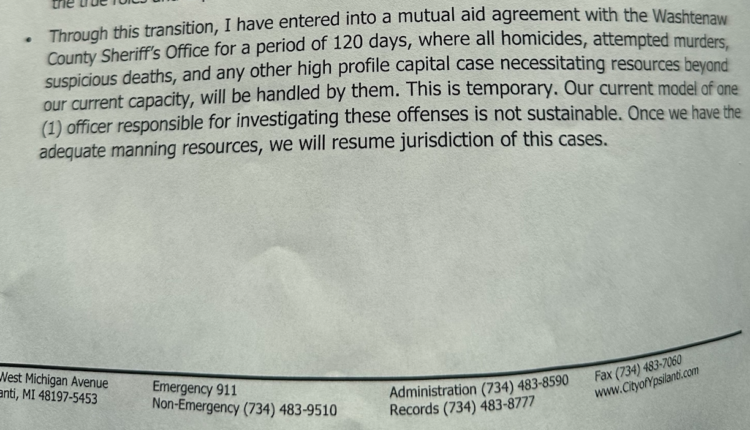Ypsi Police Chief and County Sheriff Sign Secret “Mutual Aid Agreement” Without Votes of Elected Officials
Ypsi Police Chief Kirk L. Moore, in a secret memo to his staff provided to The Ann Arbor Independent, says the YPD is undermanned and can’t investigate capital crimes such as murder and attempted murder. In the memo, he announces he has signed a mutual aid agreement with the Washtenaw County Sheriff’s Dept. Until Oct. 2. 2023, as a result, all “high profile” murders, attempted murders and suspicious deaths reported in Ypsilanti will be handled by the Sheriff’s Dept.
by P.D. Lesko
In a secret internal memo to his staff shared with The Ann Arbor Independent, Ypsilanti Chief of Police Kirk L. Moore informed his staff that he had signed a “mutual aid agreement” with the Washtenaw County Sheriff’s Dept. According to Moore’s memo, he doesn’t have the staff necessary to investigate capital crimes which he called “high profile.” These include “all homicides, attempted murders, [and] suspicious deaths.”
Moore said his mutual aid agreement runs for 120 days.
Moore and Clayton Skirted Michigan Law and Public Process
Chief Moore and Sheriff Clayton are not legally authorized to sign such agreements without a public discussion of the emergency, without a public examination of the language of the agreement and without a public vote of elected officials. In this case, Michigan law requires Ypsilanti City Council and the Washtenaw County Commissioners to vote to approve any such mutual aid agreement.
Michigan’s Mutual Aid Agreements Act 310 of 2000 requires that “An agreement entered into under this act by a county, city, village, or township law enforcement agency shall first be authorized by the governing body of that law enforcement agency.”
Mutual aid agreements between policing entities in Michigan contain the following language: “Attestation. The undersigned units of local government or public agencies hereby attest that the governing body of the local unit of government identified below has lawfully adopted and approved this Agreement and authorized him or her to execute it on its behalf.”

In May 2023, just a month after he was hired, in an interview Moore said he looked forward to building “a cohesive community and bringing the public into what we’re doing….Judge us by our actions,” Moore said in the same May interview.
In secretly declaring a policing state of emergency and secretly executing a mutual aid agreement with the County Sheriff, Kirk L. Moore pointedly did not bring the public (or their elected representatives) into what his department is doing.
Ypsi City Council Minutes Confirm No Vote Happened
Ypsilanti City Council meeting minutes going back to April 2023, when Moore was hired, show no discussion of a mutual aid agreement between Ypsilanti and the WCSO. Similarly, City Council’s meeting minutes document no vote by Ypsilanti’s elected officials to approve Moore’s mutual aid agreement.
The newspaper contacted all of the Ypsilanti City Council members and the City’s Mayor Nicole Brown to ask whether they were aware their Chief of Police had declared a state of emergency and signed a mutual aid agreement. The newspaper asked when the Councilmembers had discussed and voted to approve Moore’s mutual aid agreement.
None of the elected officials responded to repeated messages seeking comment.
Without a public discussion by the members by the Ypsilanti City Council about the details of the YPD state of emergency, and without a public vote by Ypsilanti City Council to approve the language of Moore’s mutual aid agreement, according to Michigan law Moore’s agreement is invalid.
Ypsilanti’s new Chief of Police overstepped his legal authority.
Similarly, without a public discussion and a vote of the Washtenaw County Commissioners to approve the Sheriff’s participation, Sheriff Clayton has no authority to provide mutual aid to Ypsilanti, or to unilaterally execute any agreement for mutual aid that involves giving away County resources. The July 12, 2023 meeting of the BOC included no discussion of, or vote approving a mutual aid agreement between the County Sheriff and the Ypsilanti Police Dept.
Ypsilanti’s Chief of Police, who was interviewed for an MLive article about the spike in murders in his town for an article published July 30, did not share any information with the public about his department’s state of emergency due to inadequate numbers of patrol officers and detectives. He did not mention the mutual aid agreement that his memo stated will begin Aug. 2, 2023.
Sheriff’s candidate Ken Magee characterized Moore’s actions as “throwing in the towel after a short time on the job. Unbelievable.”
County Commissioners Giving Away the Cow and the Milk
While other townships and municipalities are charged as much as $171,000 per deputy, someone with knowledge of the mutual aid agreement told the Ann Arbor Independent that Chief Moore and the City of Ypsilanti were being provided the Sheriff’s policing services free of charge.
One township Supervisor was incensed. “We all pay Clayton for deputies and services we don’t get. Ok. But Ypsilanti doesn’t get charged for what amounts to an unlimited number of Sheriff’s deputies and detectives? Pardon me, but what the hell is going on with the County Commissioners giving away services for free that the rest of us are charged through the nose for?”
Ypsilanti Twp. is the largest of the ten public entities that pay the Washtenaw County Sheriff’s Office to provide policing services.Through its contract with the Washtenaw County Sheriff, Ypsi Twp. is charged $171,000 for each of its 35 deputies. A portion of the cost of each of those deputies is subsidized to the tune of $37,500 with funds from the Public Safety and Mental Health Millage. The total subsidy, which was $3 million in 2023, used to come from the County’s General Fund.
The Sheriff recently announced he intends to require all of the municipalities that contract for policing services to apply to receive any subsidies.
One individual with knowledge of the situation said that requiring applications for the subsidies paid for with millage money voted for by township and city residents is “a huge problem. It’s extortion.”
YPD Chief Says More Police is the Answer. Sheriff Clayton Says It’s Not.
In a recent MLive.com article about the spike in murders in Washtenaw County, Sheriff Jerry Clayton was quoted as saying, “More police is not the answer.” He went on to say that his agency had no plans to put more “deputies on the streets.”
Morgan Williams is an economist at NYU’s Wagner Graduate School of Public Service. He researches the economics of crime and incarceration policy, with a particular focus on racial inequality.
According to Williams, research over the past 40 years shows that Jerry Clayton’s assertions betray a shocking ignorance of the scientifically verifiable impact of putting more “deputies on the streets.” Morgan is a data-cruncher.
“We want to be as a scientifically objective as possible,” he says about his and his colleagues’ work. Williams and his colleagues, Aaron Chalfin, Benjamin Hansen, and Emily Weisburst, got motivated to answer questions like: What is the measurable value of adding a new police officer to patrol a city? Do additional officers prevent homicides? How many people do these officers arrest and for what? And how do bigger police forces affect Black communities?
Williams and his colleagues find adding a new police officer to a city prevents between 0.06 and 0.1 homicides, which means that the average city would need to hire between 10 and 17 new police officers to save one life a year. They estimate that costs taxpayers annually between $1.3 and $2.2 million. The federal government puts the value of a statistical life at around $10 million. So, Williams says, from that perspective, investing in more police officers to save lives provides a pretty good bang for the buck. Adding more police, they find, also reduces other serious crimes, like robbery, rape, and aggravated assault.
Other research has found concentrating police in “hotspot” crime areas appears to be an effective way to reduce crime.
Unlike Clayton, Chief Moore in his memo announcing the state of emergency to his staff, was clear that more police is the answer to his department’s inability to prevent and investigate capital crimes such as murder.
Chief Moore wrote in his secret memo that his actions would “positively impact the need for continual mandated overtime.” Moore went on to tell his staff, “Our current model of (1) one officer responsible for investigating these offences is not sustainable. Once we have adequate manning resources, we will resume jurisdiction of these cases.”
“This [the county-wide spike in murders and attempted murders] is bigger than just the police,” Clayton reportedly said in an article published July 30. He added, “the community needs nonprofits, politicians and health officials to work together. “…(You have to put) in the work understanding that this is not going to be done overnight. That this is long-haul stuff that we’re talking about.”
The Sheriff’s Office was a driving force behind the 2017 Public Safety and Mental Health Millage that provides between $15-$18 million annually for public safety and mental health service improvements. Since 2019, when the millage first became available to county government, taxpayers have handed over $68 million. Of that amount, Washtenaw County Community Mental Health (CMH) receives $5-$6 million annually.
The Ann Arbor Independent recently reported the fact that Trish Cortes, Dir. of Community Mental Health, has been diverting hundreds of thousands of dollars of that millage money to pay consultants who earn as much as $260 per hour, to buy positive “news” coverage about CMH from Concentrate Media, and to pay for billboard, print and other advertising to convince the public that mental health services have been expanded.
In addition, the newspaper reported that callers to the CMH Crisis Hotline, a service funded with millage money, are turned away without crisis intervention services, counseling or any other services being offered to callers.
The Public Safety and Mental Health millage will end in 2026 if it not renewed by voters.
Chief Moore was asked about his memo in an email and did not reply.
The Ann Arbor Independent has filed a Freedom of Information Act for a copy of the mutual aid agreement entered into by Moore and the WCSO.


Comments are closed, but trackbacks and pingbacks are open.